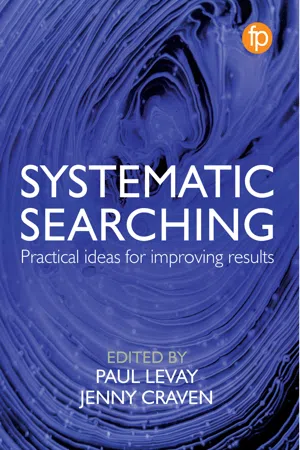
Systematic Searching
Practical ideas for improving results
- 208 pages
- English
- PDF
- Available on iOS & Android
Systematic Searching
Practical ideas for improving results
About this book
In resource poor, cost saving times, this book provides practical advice on new methods and technologies involved in systematic searching and explores the role of information professionals in delivering these changes
The editors bring together expert international practitioners and researchers to highlight the latest thinking on systematic searching. Beginning by looking at the methods and techniques underlying systematic searching, the book then examines the current challenges and the potential solutions to more effective searching in detail, before considering the role of the information specialist as an expert searcher.
Systematic Searching blends theory and practice and takes into account different approaches to information retrieval with a special focus being given to searching for complex topics in a health-related environment. The book does not presume an in-depth prior knowledge or experience of systematic searching and includes case studies, practical examples and ideas for further research and reading.
The book is divided into three parts:
- Methods covers theoretical approaches to evidence synthesis and the implications that these have for the search process, including searching for complex topics and choosing the right sources.
- Technology examines new technologies for retrieving evidence and how these are leading to new directions in information retrieval and evidence synthesis.
- People considers the future of the information specialist as an expert searcher and explores how information professionals can develop their skills in searching, communication and collaboration to ensure that information retrieval practice is, and remains, evidence-based.
Systematic Searching will be essential reading for library and information service providers and information specialists, particularly those in a health-related environment. It will also be of interest to students of library and information science, systematic reviewers, researchers and practitioners conducting complex searches in settings including social care, education and criminal justice.
Tools to learn more effectively

Saving Books

Keyword Search

Annotating Text

Listen to it instead
Information
Table of contents
- Title page
- Contents
- 1 Introduction: where are we now?
- 2 Innovative approaches to systematic reviewing
- 3 Searching for broad-based topics
- 4 Choosing the right databases and search techniques
- 5 Gathering evidence from grey literature and unpublished data
- 6 Social media as a source of evidence
- 7 Text mining for information specialists
- 8 Using linked data for evidence synthesis
- 9 Evidence surveillance to keep up to date with new research
- 10 Training the next generation of information specialists
- 11 Collaborative working to improve searching
- 12 Communication for information specialists
- 13 The information specialist as an expert searcher
- 14 Conclusion: where do we go from here?
- Glossary
- Index
Frequently asked questions
- Essential is ideal for learners and professionals who enjoy exploring a wide range of subjects. Access the Essential Library with 800,000+ trusted titles and best-sellers across business, personal growth, and the humanities. Includes unlimited reading time and Standard Read Aloud voice.
- Complete: Perfect for advanced learners and researchers needing full, unrestricted access. Unlock 1.4M+ books across hundreds of subjects, including academic and specialized titles. The Complete Plan also includes advanced features like Premium Read Aloud and Research Assistant.
Please note we cannot support devices running on iOS 13 and Android 7 or earlier. Learn more about using the app